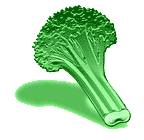|
Sulforaphane is a chemical compound abundant in green vegetables such as broccoli and brussel sprouts. Previous research has shown that sulforaphane can inhibit the growth of cancerous tumors in animals, and can induce apoptosis, or programmed cell death, in colon cancer cells. A new study published in the Journal of Nutrition suggests that sulforaphane may also slow the spread of breast cancer cells.
In the study, researchers treated samples of a malignant tumor in a laboratory setting with various concentrations of a sulforaphane solution (SUL). The cells were observed every few hours to determine rates of mitosis, or cellular division.
 The scientists found that within 48 hours, sulforaphane "inhibited cell proliferation" and "induced significant inhibiation of DNA synthesis" in the tumor cells. It appeared to do so by disrupting the action of certain protein microtubules in the cells, which are vital for successful cell division. The scientists found that within 48 hours, sulforaphane "inhibited cell proliferation" and "induced significant inhibiation of DNA synthesis" in the tumor cells. It appeared to do so by disrupting the action of certain protein microtubules in the cells, which are vital for successful cell division.
The scientists concluded that their study "is the first to report the effectiveness of SUL as an inhibitor of human mammary carcinoma proliferation and to provide confirmatory evidence of a recently identified novel mechanism of SUL action."
They recommended that future studies be conducted "to ascertain the implications of SUL intake as a result of either the consumption of cruciferous vegetables in the diet or potential chemoprevention strategies directed toward persons deemed to be at high risk for developing malignancy."
Reference:
Jackson ST, Singletary KW. Sulforaphane inhibits human MCF-7 mammary cancer cell mitotic progression and tubulin polymerization. Journal of Nutrition September 2004;134:2229-2236.
To read more about general health, go to https://www.chiroweb.com/find/archives/general.
|



